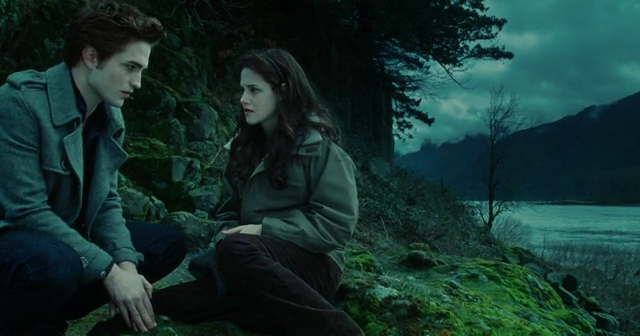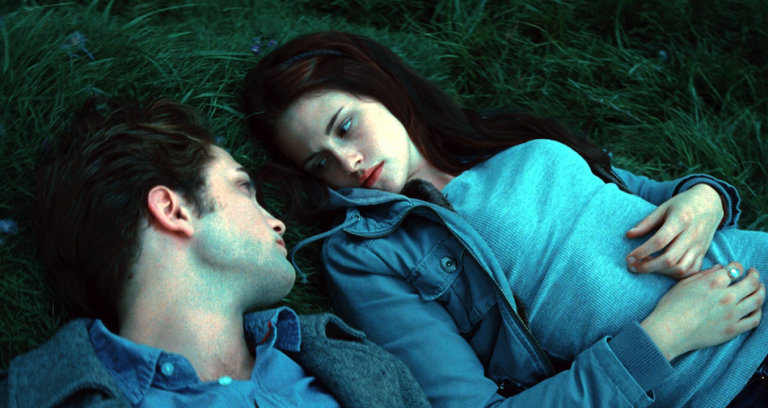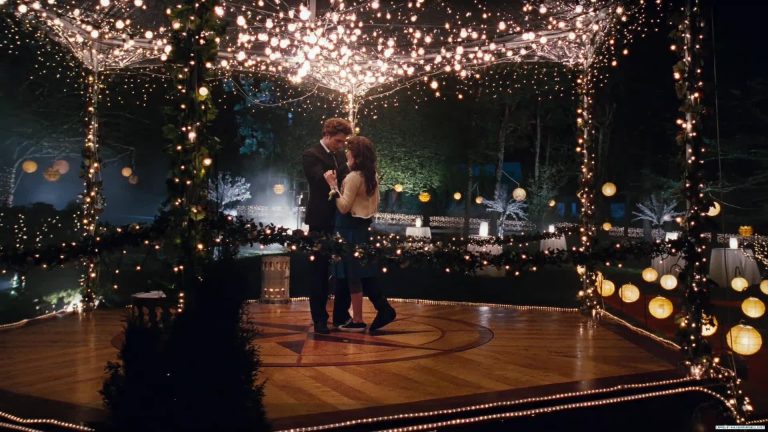When Twilight was released ten years ago it was met with massive financial success and a wave of scorn. It was a dumb book made into a dumb movie and sold to dumb girls. It was ripe for parody. It launched a thousand think pieces dissecting it’s deeply troubling gender politics. And it became a mainstay at the Razzies. An easy punchline for all the laziest jokesters.
For my part, I never saw the movie. Or read any of the books. My little sister who was closer to the target demographic told me it was dumb, and showed me the baseball scene on YouTube. It was indeed dumb. So my experience with the property, like the experiences of a lot of adults, was very second hand. There was never anything appealing about the thing itself, and I was much happier experiencing the phenomenon through Saturday Night Live sketches or Lindsay Ellis videos.
But looking back on the film a decade later, it suddenly doesn’t seem like such a bad idea. The cast that once featured “the worst actress of all time” Kristen Stewart and her pretty boy hack boyfriend, is now full of indie darlings, Anna Kendrick, Robert Pattinson, and “best actress of her generation” Kristen Stewart. The hipster vampire romance genre that caused so many eye rolls back in ‘08 has gone on to produce some of the best films of the last decade. Only Lovers Left Alive, Da Sweet Blood Of Jesus, A Girl Walks Home Alone At Night, What We Do In The Shadows, even Let The Right One In, which came out that same year, may not have found financing and distribution if Twilight wasn’t such a massive success. Even the Oscars have gotten in on the act, giving their highest honor to an even more preposterous romantic twist on a Universal monster. So much of the last decade of film rests on the shoulders of Twilight. Without it there’s probably no Hunger Games, and with no Hunger Games, we also probably don’t get the action heroine resonance, meaning no Mad Max: Fury Road, no Wonder Woman, no Atomic Blonde. Maybe the new Star Wars movies stick with male leads. Jennifer Lawrence never becomes the biggest star in the world, and never enters her weird experimental phase. Without Twilight, Kristen Stewart and Robert Pattinson don’t have the freedom or impetus to rebel against their images and we don’t get Personal Shopper, Clouds of Sils Maria, Good Time, Cosmopolis, and a whole mess of strange and challenging films. Does Pitch Perfect get made if Anna Kendrick doesn’t have such a massive hit on her resume? And how many musicals owe their greenlight to Pitch Perfect? Of course we wouldn’t have 50 Shades of Grey, and whatever the quality of those films are, their own legacy is still being written. And how many doors were opened by the massive success of such a feminine property – from the source novel to the screenplay to the direction to the star to the audience, this was a woman’s picture in a way that was all but unprecedented on this scale at the time. The Dark Knight led to some pretty good Nolan movies and a lot of disasters that tried to ape its tone. Iron Man launched the MCU and sunk every other franchise that tried to imitate its shared universe. Transformers, released the year before, ushered in an increasingly noisy, sloppy style of action and left its stars barely employable. But Twilight has a real legacy to be proud of, and knowing where it led, it’s impossible for me to muster any animosity towards it. So I decided to finally sit down and watch the damn thing…
Hmmm…
So I sketched out that intro a few weeks ago just to see if I had enough material for an essay before I committed to seeing the movie. The idea was to use Twilight as a jumping off point to discuss the better movies it influenced. “Jarmusch inverts the approach of Twilight, embracing the vampire lore while trading the young, passionate, and let’s be honest, shallow teenaged romance for the deep intimacy and trust of two people who have loved each other for centuries…” – stuff like that. But now that I’ve seen the movie, I have to say…
It’s pretty great.
The first thing that jumps out at you about Twilight is, for such an era-defining movie, how out of step it is with the prevailing style of it’s time. Twilight is above all an earnest film. Unflinchingly, achingly, embarrassingly earnest. Edward is the prettiest boy who ever lived and his love for Bella is the deepest truest love that was ever loved. It’s what makes the movie so mockable, but also what makes it so admirable. There’s an intensity here, and an honesty of emotion. That self-awareness that most modern movies throw up as a shield to ridicule, isn’t there. What joke can you make about Iron Man that Robert Downey Jr. hasn’t already made? But when Edward throws off his shirt in Twilight to reveal his glistening supernatural beauty, the movie means it. There’s no irony here. Everything about the film is reaching for something deep, and profound, and raw. From Bella’s opening line, “I’ve never given much thought to how I would die but dying in place of someone I love seems to be a good way to go,” the movie is always pushing for an intensity and a weight far beyond it’s genre trappings. That’s such a heavy sentiment for a seventeen year old. But it’s right for the character, and for the film. This is a girl who thinks heavy, romantic, tragic thoughts. And if her own life doesn’t seem to warrant such romance and tragedy, well when has that ever stopped a teenager before? If there’s an emptiness at the center of all this tempestuous emotion, isn’t that a very honest reflection of the teenage condition? Catherine Hardwicke grounds all of this in a subtle, impressionistic, and authentic portrait of highschool life. Everyone in this film is so uncomfortable in their own skin. There’s this constant sense that the kids are performing for each other. They’re all trying to mask their emotions and failing miserably, but all their friends are oblivious because they’re too wrapped up in themselves. The scene where Bella and Edward first meet is one of the most painfully awkward interactions I’ve ever seen in a movie. Both their brains are a hormonal swamp and they’re trying to stare at each other without being noticed even though they’re sitting right next to each other. Their conversation is incredibly banal, both talking just to keep the other talking, but also hanging on each other’s words, and on top of all this they also actually care about their chemistry assignment and get all anal about following the rules. This is a movie that understands how teenagers experience the world, and also how they actually exist within it.
Individual scenes unfold at the lyrical pace of a character study, but the story itself moves at a fast clip. Edward and Bella get closer to each other in each scene they share, and every few minutes we stop to watch some people get eaten by vampires. For being a small low-key romantic drama, it has a fair amount of incident, and every scene moves the story and the relationships forward. It’s an aesthetically strong film, with a cool blue color palette and plenty of interesting and memorable compositions helping to create a sustained mood- an otherworldliness that sells the supernatural and the romance. A less distinctive movie would not be so easy to parody. The much-ridiculed acting is actually pretty good, as well. People often conflate performance and character, and some of the lines these two are asked to deliver are simply cruel.
“And so the lion fell in love with the lamb.”
“What a stupid lamb.”
“What a sick, masochistic lion.”
That exchange is supposed to be flirtatious. And achingly romantic. There is no actor on earth that could pull that off. Stewart gets the better half of the bargain, both in that exchange in which she gets to play off the dumb thing he said instead of trying to sell the non-sequitur, but also in the movie as a whole, because as much as she may be intended as an audience insert, she’s still playing a character. Whereas Edward is an impossible set of contradicting fantasy traits. The baddest bad boy who is also supernaturally sensitive. Obsessively devoted but aloof. Eternally young but also well-traveled and sophisticated. This is why it’s so difficult for me to be concerned about the gender dynamics. Don’t get me wrong, dear reader. If any boy ever treats you the way Edward treats Bella in this movie, I want you to lock all your doors and windows and call the sheriff. But this is so clearly a fantasy, and the viewpoint is so unwaveringly Bella’s. You know, Batman and Robin’s relationship is also abusive. I like James Bond, but I wouldn’t want my government giving any actual spies licenses to kill and limitless no-questions-asked expense accounts. The fantasy is that Edward is dangerous, but never crosses the line. It’s supposed to be a little bit transgressive. And the film is aware of it. Bella is constantly calling Edward out for the way he treats her, and he becomes much more open and caring as the story progresses. If this is a bad message to send girls, it’s also one that’s in everything from Beauty And The Beast to Casablanca. At one point, Edward tells Bella,“I’m the most dangerous predator. Everything about me invites you in; my voice, my face, even my smell. As If I would need any of that. As If you could outrun me. As if you could fight me off.” It’s an interesting take on masculinity, dangerous not only for its potential for violence, but also for its seductive beauty. This is the sort of thing that you lose when all your art reflects the same perspective. Notice too, that the operative sense here is smell. This is a recurring motif throughout the movie, and keeps it in the realm of the earthy, physical, and lustful. Edward does not want to listen to Bella’s thoughts, or sit and admire her beauty. He wants to devour her. And this is her fantasy. To be devoured. To be wanted beyond all reason or restraint, by someone you want more than you want to be alive.
Now look, I haven’t lost my mind here. I understand Twilight is a flawed film. It’s overwrought and deeply silly. The special effects are awful both in execution and conceit. The dialogue is often atrociously overwritten. The characters are thin, the romance is juvenile, and many individual scenes are unintentionally hilarious. Vampire baseball is still the most ridiculous thing I’ve ever seen in a movie, and would be even if three rival vampires, in the more campy Victorian style, hadn’t shown up, challenged the Cullens to a baseball game, and gotten into a fight where everyone is doing jazz poses and hissing at each other like cats. But the bad scenes are lively and laughable, and they’re balanced out by a lot of stuff that works. The acting is strong. The leads have a sweaty, palpable chemistry. And the supporting cast, particularly Anna Kendrick, Billy Burke, and Gil Birmingham, are distinctive and fully formed. The storytelling and characterization is at times subtle and efficient. And the world of the movie feels like a real place populated by real people. And for every ridiculous misguided scene there’s two or three that just work. Like the scene where Bella meets the rest of the Cullens, and the entire family is making dinner for her and are all planning on sitting and watching her eat it -because as vampires, they don’t eat food themselves. That’s a clever scene, drawing something that is relatably awkward to comic heights without undermining the reality of the story. There’s an action scene late in the film that isn’t groundbreaking or extraordinary, but is effectively shot, tense, and exciting. There are action directors working with ten times the budget Hardwicke had who’ve never shown as much aptitude in the genre.
The final scene of the movie epitomizes Twilight. It’s logistically ridiculous. Bella and Edward are at their junior prom and are dancing in a private outdoor gazebo. It’s the sort of thing a twelve year old might imagine a high school dance to be. Bella asks Edward why he didn’t let her turn her into a vampire when he had the chance, and he offers to bite her neck right here, metaphorically deflower her right in front of everyone on the dance floor. And she wants him to. And without hesitating, she leans back and stretches out her neck, and he dips down and tenderly kisses it. And the scene just works, damn it. Its beautiful and sexy and playful and earnest. And it doesn’t matter how silly or overwrought or logistically impossible it is, the moment lands.
Twilight is a strange movie. Low-key and operatic, emotionally honest and preposterous, influential and critically derided, sexual and childish, beloved and despised – all in equal measure. It’s beautiful and strange and unique, and we’re all better off having it in the world.



